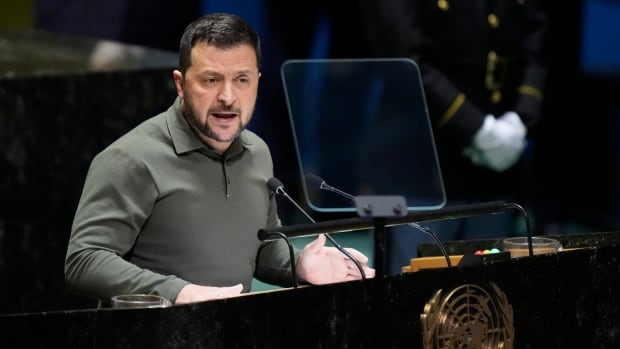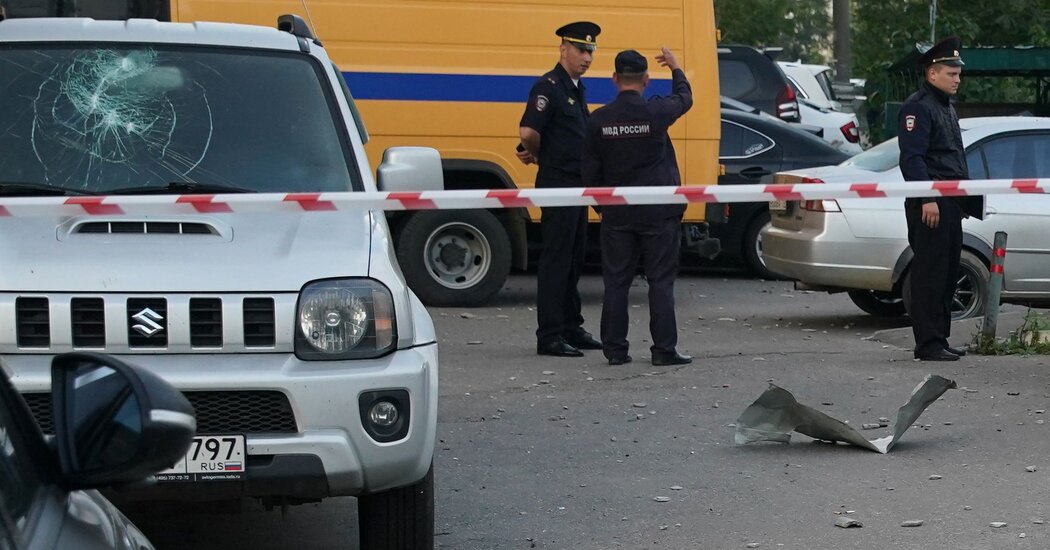Ukraine President Volodymyr Zelenskyy has been lauded as a wartime leader since Russia began its full-scale invasion in February 2022. But some continue to question his commitment to making good on his pledge to fight graft.
Ukraine consistently ranks in the bottom half of Transparency International’s annual Corruption Perceptions Index. Only Russia was rated more corrupt in Europe in the 2022 rankings from the non-government organization.
Billions of dollars of aid earmarked for Zelenskyy’s government, as well as ambitions to join the European Union, ride on Ukraine proving that it is serious about fighting corruption and embracing good governance.
Yaroslav Zheleznyak, an opposition lawmaker, said Western donors should take note. So far, more than 41 countries, including Canada have committed a total of more than $140 billion US in civil and military aid to Ukraine, according to the Ukraine Support Tracker of the Kiel Institute for the World Economy.
Zheleznyak told Reuters that unless corruption is addressed, Western donors risk losing substantial sums.
“Now, they are stealing our money,” Zheleznyak said of officials who tolerated graft. “In the future, they could steal your money.”
Bribery allegations follow Ukraine minister
A survey by two Kyiv pollsters released on Sept. 11 found that 78 per cent of Ukrainians hold Zelenskyy accountable for government corruption. A related poll found that 55 per cent believe Western military aid should be conditional on fighting corruption.
Zelenskyy fired more than a dozen senior officials in January amid public allegations of graft and impropriety, and on Aug. 11, he fired all the regional heads of military recruitment centres, after an audit turned up alleged abuses by officials, including illegal enrichment.
On the first day of the UN General Assembly in New York City, leaders warn of a dire state of global affairs. Headlining Day 1 of speeches were presidents Joe Biden of the U.S. and Volodymyr Zelenskyy of Ukraine.
On Sept. 12, after a public outcry, Zelenskyy vetoed legislation that would have allowed officials to keep their mandatory asset disclosures sealed from public view for a year.
This month, Zelenskyy also replaced his defence minister, Oleksii Reznikov. The president cited the need for “new approaches,” but the move came soon after a series of allegations levelled by Ukrainian media that the defence ministry was procuring goods at inflated values. Reznikov told a press conference in Kyiv a week before his ouster that the reports are inaccurate.
Oleh Tatarov, the president’s adviser on law enforcement and security agencies since 2020, remains on the job.
Oleh Maiboroda, once a chief executive of one of Ukraine’s biggest construction firms, said that for years, he kept rolls of dollar bills in a safe behind his desk to hand over to Tatarov. The money, Maiboroda told Reuters, was intended to bribe public officials to approve building projects.
“Tatarov used to solve all issues with law enforcement,” Maiboroda said in an interview in Vienna, where he has settled to escape prosecution in Ukraine for his own alleged role in corruption schemes involving the construction firm Ukrbud Development LLC.
Maiboroda said bribes flowed through Tatarov from 2014 to 2019, while the latter was a legal adviser to a company that was part of the state-owned Ukrbud. Before that, Tatarov was an official in the government of Viktor Yanukovych, the pro-Russian president toppled by a popular uprising in 2014.
Calls to remove Tatarov
Maiboroda said Tatarov was a slick operator, working away from the office in cafés where he met his contacts and used encrypted apps for communications.
“He knew about law enforcement and warned us to be careful about saying almost anything on the phone,” Maiboroda told Reuters.
He said Tatarov either collected cash payments himself or sent a driver to do so.
“Of course he was paying” to smooth projects with authorities, including by securing building permits, Maiboroda said. “He was giving them money so these arrangements were done,” he added.
Maiboroda provided no proof of his accusations, but they echo an allegation against Tatarov levelled by Ukraine’s anti-corruption agencies that he organized a bribe.
Tatarov has denied wrongdoing and has been convicted of no crime. He has said his accusers are trying to settle political scores.
Zelenskyy has previously said corruption has no place in his administration.
Daria Kaleniuk, executive director of Ukraine’s Anti-Corruption Action Centre (AntAC), an NGO, believes that in a healthy democracy, any official accused of corruption should be suspended until cleared.
“Unless Zelenskyy gets rid of Tatarov, he won’t be seen as serious in purging the country of corruption,” she told Reuters.
Investigation stalled, then closed
The construction sector is typical of the blurred lines between public and private sectors in post-Soviet Ukraine.
Maxym Mykytas, the former chair of Ukrbud, is currently in prison, charged with an alleged bribery scheme involving a subway contract.
Two senior law enforcement officials told Reuters that Mykytas confessed to the bribe in an October 2020 video recording, in which he said Tatarov arranged the payment. Tatarov has not commented on the matter.
“Tatarov and I did everything together, but if Tatarov sits in the President’s Office, why should I be in prison?” Mykytas told a Ukrainian news website in December 2020.
The Current19:06Corruption concerns in Ukraine prompt government shakeup
A corruption scandal in Ukraine has forced several key government officials to resign or be dismissed, amid allegations of profiteering off the war. Matt Galloway talks to Politico Europe reporter Veronika Melkozerova; and Tymofiy Mylovanov, former Ukrainian minister of economic development and now president of the Kyiv School of Economics.
In early 2021, Mykytas withdrew his confession. He told Reuters he accused Tatarov in the mistaken belief that Tatarov and others were trying to steal his business.
Meanwhile, an investigation into the Tatarov allegations from the state security service stalled. A court in Kyiv then refused to give investigators more time and, in April 2022, state prosecutors closed the case on procedural grounds.
Also under suspicion is Andriy Yermak, an associate from Zelenskyy’s prior career in the entertainment world.
In March 2020, a month after Yermak became the president’s chief of staff, video tapes surfaced in which Yermak’s brother, Denys, now a soldier, is heard discussing appointments to government jobs and suggesting he could open doors. Denys confirmed the recording was of him, but said the tapes had been edited in a politically motivated bid to discredit his brother.
Andriy Yermak also dismissed the recordings as a political hit job.
Citizens weary of corruption
Neither Zelenskyy nor Tatarov responded to detailed questions to Reuters.
The view that corruption persists in wartime is widespread among several dozen residents interviewed by Reuters in a visit to several towns and villages north of Kyiv. There is hope that, after the sacrifice of war, the country has reached a turning point.

Pointing to an alleyway in Irpin where volunteers bring food to residents, Halyna, a 44-year-old local woman, said that nowadays when she deals with local officials, “there’s no hint of bribes anymore.”
Kaleniuk, the anti-corruption campaigner, believes the war has created irreversible pressure for reform.
“Everything has changed” since Russia’s invasion, she said. “The demand for a change in society is huge.”
Ukraine’s anti-corruption authorities say they have doubled down on their work and say they have made more progress than at any time since their establishment in 2015. In the first half of this year, they launched nearly 300 cases and sent 58 indictments to court, according to the National Anti-Corruption Bureau of Ukraine (NABU).
Current NABU director Semen Kryvonos told Reuters his agency is prioritizing wartime crimes in key sectors like defence and reconstruction.
In a report in June, the International Monetary Fund said donors and foreign investors need to see reforms to improve governance, transparency and tackle corruption “without delay.”
In an assessment of Ukraine’s chances of EU membership, published in June 2022, the European Commission described corruption as “a serious challenge that requires continued attention.”


